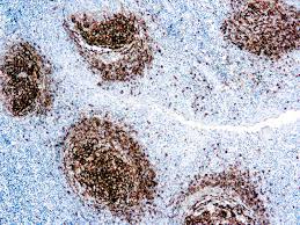
The CD23 Antibody (Mouse Monoclonal, Clone 1B12) is a high-affinity, well-characterized antibody specifically designed for the detection of CD23, a low-affinity IgE receptor (FcεRII) expressed on activated B cells, monocytes, dendritic cells, and some epithelial cells. CD23 plays a critical role in the regulation of IgE synthesis, B-cell differentiation, and immune response modulation, making it a valuable biomarker in immunology, allergy research, and the study of B-cell malignancies. Clone 1B12 is a mouse monoclonal antibody optimized for strong, specific binding to human CD23, and demonstrates excellent performance in flow cytometry, immunohistochemistry (IHC) on formalin-fixed paraffin-embedded (FFPE) tissues, and immunofluorescence (IF). It delivers precise staining with low background, enabling accurate identification of CD23-positive cell populations in lymphoid tissues and tumor samples. This antibody is widely used in the characterization of chronic lymphocytic leukemia (CLL), Hodgkin lymphoma, and atopic conditions, and serves as a reliable tool in both basic research and diagnostic pathology.
Mouse monoclonal
1B12
IgG1
Immunohistochemistry 30-40 min. At RT. Staining of formalin-fixed tissues requires heating tissue sections in between pH 7.4 - 9.0 for 45 min at 95oC followed by cooling at room temperature for 20 minutes.
Buffer with protein carrier and preservative.
Humans; others not tested.
Follicular lymphoma or tonsil (mantle cell lymphomas are generally negative)
Cytoplasmic and cell membrane
This product is not sterile.
Recombinant fragment (around aa 48-321) of human FCER2/CD23 protein